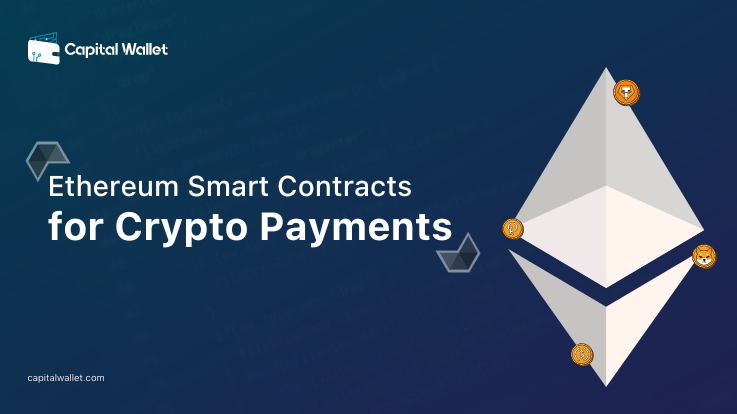
Ethereum has been among the top blockchain platforms the past few years, leading the smart contract revolution with its robust foundation for process automation and with the creation of trustless apps. Its technology has the potential to reshape various industries by streamlining processes and enhancing security through the use of secure and accessible services for sending, trading, storing, and accepting cryptocurrencies, especially accepting ETH at an enterprise level. A significant part of this capability lies in Ethereum smart contracts for crypto payments. This article explores the world of Ethereum smart contracts and their role in facilitating crypto payments.
Navigating Ethereum’s Solidity Language
Developers use Solidity, a computer language, to create self-executing, tamper-resistant digital contracts like those Ethereum uses. Network nodes on the Ethereum blockchain store and run these contracts. The Ethereum Virtual Machine (EVM) processes the smart contract code, ensuring consistent execution across the network.
Functions and state variables define the behavior and data storage of smart contracts. Other contract functions or events outside the contract call these sections of code, known as functions. State variables allow the contract to preserve its state in between function calls by storing data persistently on the blockchain.
Ethereum smart contracts use events to interact with external systems. These events, recorded on the blockchain, can trigger off-chain operations. Events offer a method to track and respond to modifications in the contract’s state, facilitating easy connection with other systems, including those handling crypto deposits
Implementation and Interaction
Developers use the Solidity programming language to construct a smart contract. This contract outlines the rules and operations for a decentralized application on the Ethereum Network. Afterward, developers convert the smart contract into bytecode, a simpler representation of the code. The Ethereum Virtual Machine (EVM) can interpret and execute this bytecode. This bytecode is essential as it allows network nodes to process and understand the smart contract efficiently. Once compiled, the developer submits the contract as a transaction to the Ethereum network. After mining and incorporating the transaction into the blockchain, the smart contract becomes “deployed” and ready for user interaction.
To interact with Ethereum smart contracts, users transmit transactions containing specific function calls, like money transfers or data updates. These transactions then pass through the Ethereum Virtual Machine (EVM), which carries out the appropriate smart contract code and updates the blockchain’s contract state. Transactions may also contain supplemental data, such as input parameters for function calls or unique metadata for each transaction.
Interaction with a smart contract requires users to have knowledge of the contract’s address and its Application Binary Interface (ABI). The ABI is a JSON representation of the contract’s functions and data structures. It serves to encode and decode function calls and return values, thus enabling users to interact with the smart contract via web3 libraries or their Ethereum wallets.
The Economics of Smart Contract Execution with Regards to Gas
To execute smart contracts on Ethereum, you need “gas,” a measure of the network’s computational capacity. Users pay for gas using Ether (ETH), the Ethereum network’s native currency. When initiating a transaction, users must set a gas limit and gas price, as each operation within a smart contract consumes a specific amount of gas. The gas price determines the priority of the transaction; setting a higher price can increase the chance of quicker execution.
Applications in the Industry and Use Cases
There are several applications for Ethereum smart contracts in different sectors, including:
- Finance: Smart contracts have the potential to revolutionize the financial industry by automating payment, loan disbursement, trading, and mortgage processes. In the banking industry, they can assist customers in complying with regulatory frameworks such as those implemented by KYC-Chain. Smart contracts reduce the cost of transactions for all parties by eliminating the need for intermediaries. By automating information and documentation administration in the mortgage industry, they can reduce complexities and eliminate unnecessary steps.
- Real Estate: By replacing traditional brokers and advertising platforms with smart contracts, real estate transactions can be streamlined. For example, property deeds can be tokenized on the Ethereum blockchain, and when a property is ready to be sold, a smart contract can be established between the buyer and seller to manage the transaction securely and efficiently. This will involve the accepting ETH as a payment for property transactions, further simplifying the process.
- Supply Chain: Smart contracts and blockchain technology play a crucial role in modern supply chains. As the networks of warehouses and retail outlets become more intricate, it becomes difficult for businesses to monitor products and payment schedules. Smart contracts can automate these procedures, thereby streamlining product monitoring and cryptocurrency payments and enhancing accountability.
A great example of a company that utilizes Ethereum’s smart contracts in its crypto payment solutions, providing merchants and businesses with efficient, secure, and transparent transactions is Capital Wallet. This practical application contributes to the development of an interconnected digital landscape, allowing for the acceptance of cryptocurrencies such as Ether. As more organizations recognize and adopt the advantages of Ethereum’s smart contract technology, we can anticipate a continued growth in transformative solutions that will reshape industries and drive progress in the digital realm.
Summing up!
To conclude, Ethereum’s smart contract capabilities offer powerful solutions for automating business processes, facilitating trustless transactions, and promoting innovation across digital industries. With the growth of services like Capital Wallet’s crypto payment gateway and the increasing use of Ethereum smart contracts for crypto payments, we can anticipate continued growth in transformative solutions that will reshape industries.
For more information about Capital Wallet, please visit us at: https://capitalwallet.com/

